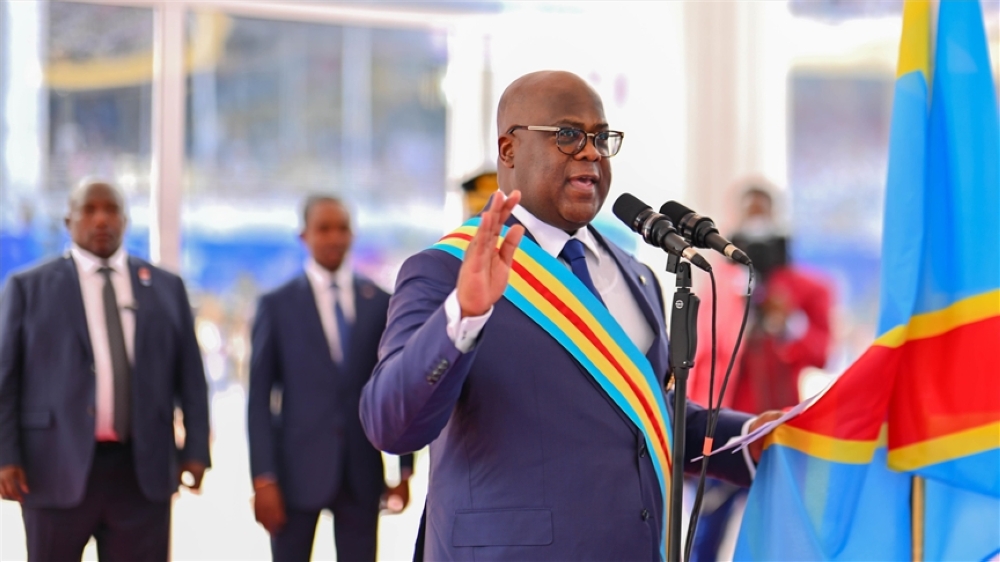

In a stunning display of political acrobatics that only a true visionary could muster, President Félix Tshisekedi of the Democratic Republic of Congo (DR Congo) has doubled down on his unshakable promise to crush the M23 rebels—whom he believes are "Rwanda's problem"—and topple the Rwandan government while he's at it.
In what can only be described as a masterstroke of foreign policy, Tshisekedi recently swore that not only would he never negotiate with M23 "Rwanda," but also that the only place he would meet President Paul Kagame again would be in heaven.
Surely, there's nothing confusing or ironic about that. But now, with rumours of backdoor negotiations and the unravelling of his "crush-the-M23" campaign, it seems Tshisekedi might be stuck between a rock and a narrative he created.
He is scrambling to explain how an organisation that, by all accounts, entered the DR Congo from Uganda somehow became Rwanda's problem in his speeches.
Perhaps heaven is closer than we think, or perhaps it's just easier to point fingers than deal with the truth.
The curious case of M23
For those watching the Great Lakes Region from the sidelines (preferably with popcorn), it's obvious that the M23 rebels did not pop out of Rwanda’s forests, armed and dangerous.
They emerged from Uganda, yet somehow, Tshisekedi’s magical narrative machine managed to make them Rwanda’s problem. How? Well, that’s one for the political wizards to explain.
But let’s face it—blaming Rwanda is an old habit, and old habits die hard.
So, despite the glaringly obvious fact that M23’s origins are Ugandan, Tshisekedi has woven an alternate reality where everything that goes wrong in the DRC is somehow Rwanda’s fault.
After all, who cares about facts when you’ve got a good story?
Now, here comes the truly spectacular part: Tshisekedi vowed never to negotiate with M23, calling it "Rwanda’s puppet.” Yet, in a twist of Shakespearean proportions, whispers of negotiations are now echoing through the halls of power.
And Tshisekedi? Well, it seems that meeting Kagame "in heaven" might have to be rescheduled for a later date, as heaven will have to wait for this awkward reunion.
This sudden shift has left Tshisekedi’s war rhetoric crumbling, and for a leader who promised to uproot Kigali and replace Kagame, it’s quite demeaning—if not outright embarrassing—to be seen negotiating with the very forces he swore to destroy.
The bitter truth: DRC’s crisis is internal
If Tshisekedi is to ever salvage this mess, he’ll need to stop clutching at convenient scapegoats and start addressing the reality on the ground.
M23 is a Congolese problem, composed of Congolese citizens, driven by Congolese grievances. The DRC’s crises cannot be neatly externalised to Rwanda, Uganda, or any other nearby country.
The uncomfortable truth is that Tshisekedi’s "war on Rwanda" is a distraction from the DRC’s own failures. North Kivu, South Kivu, and Ituri provinces have long suffered under the weight of internal mismanagement, and no amount of war rhetoric against Rwanda is going to fix that.
As the dust settles, Tshisekedi must face the uncomfortable reality that the Congo’s problems require Congolese solutions.
Yes, it’s much easier to blame Rwanda and Kagame for everything, but scapegoating won’t bring peace or prosperity.
If Tshisekedi genuinely wants to lead his country toward stability, it’s time to look inward and address the DRC’s internal contradictions.
And then there’s the matter of the FDLR, the genocidal group operating within the DRC’s borders. Tshisekedi’s government, whether through active collaboration or sheer neglect, has allowed this group to remain a thorn in the region’s side.
If he truly wants to secure peace, Tshisekedi needs to reevaluate his tolerance for such groups instead of using them to bolster his anti-Rwanda narrative.
The bottom line
It’s time for the DRC to stop externalising its problems. Félix Tshisekedi’s war rhetoric is not only misguided but also dangerous to the very people he claims to protect. If he continues down this path, the only thing he’ll succeed in uprooting is his own credibility.
As for meeting Kagame in heaven? Maybe Tshisekedi should focus on cleaning up his own house here on earth first. After all, if you want peace and prosperity, you can’t ignore the bitter truth—you have to face it head-on.


